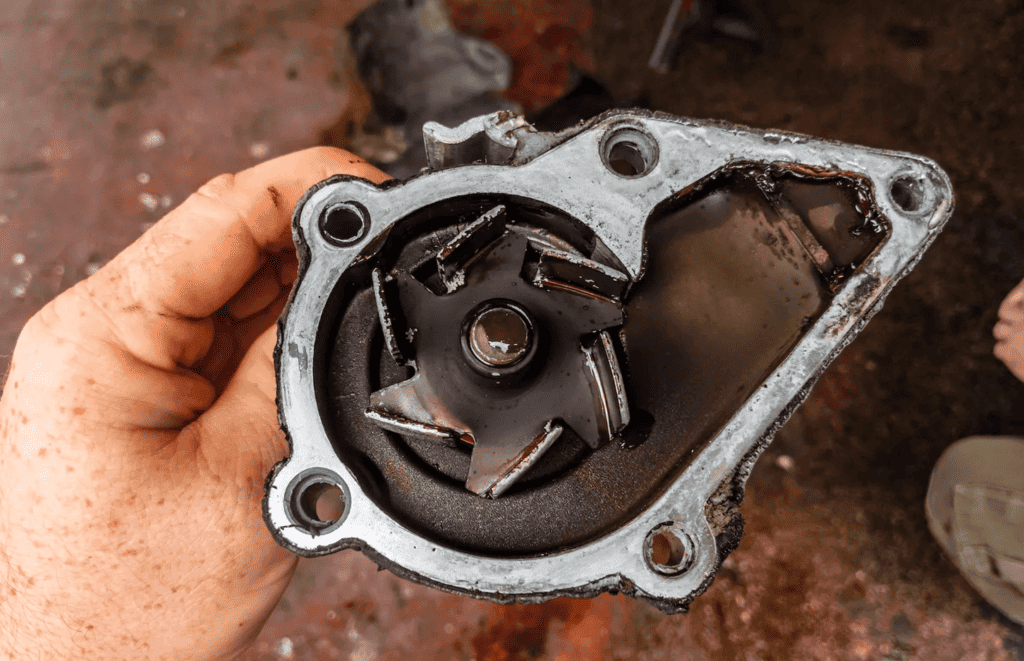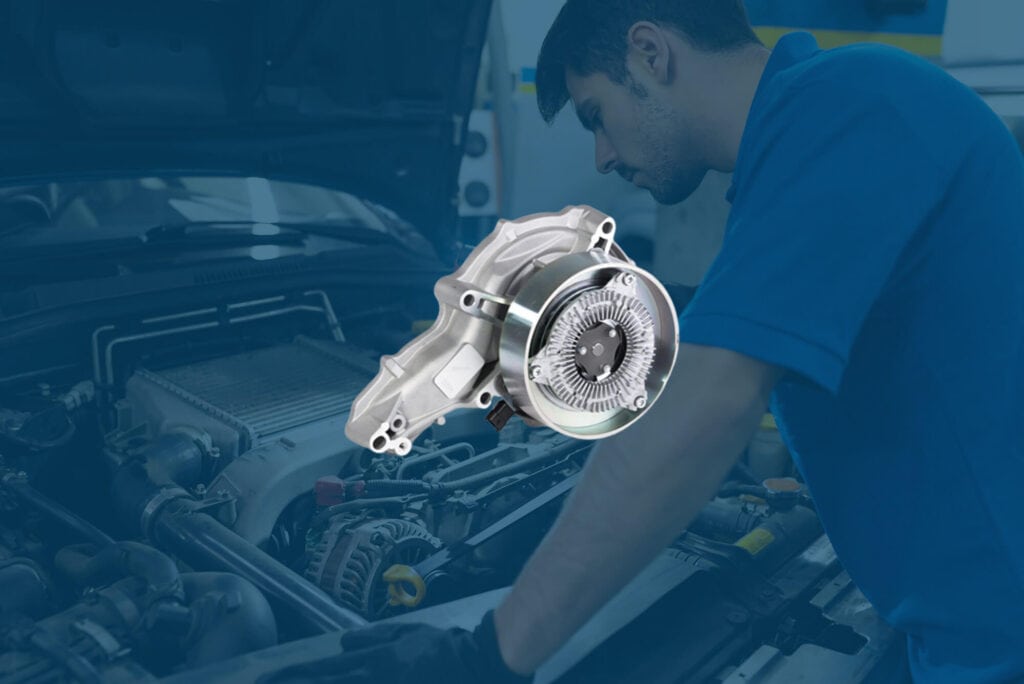Navigating Water Pump Repairs – The DIY Dilemma
Water pump troubles in a vehicle often present a fork in the road for car owners: dive into the world of DIY repairs or call in a professional? This article navigates through the intricacies of water pump issues, weighing the pros and cons of DIY efforts versus professional help, and underlining when it’s time to dial a mechanic, especially a mobile one.
Understanding Your Water Pump: The Basics You Need to Know
Core Functionality: The water pump, often considered the heart of your vehicle’s cooling system, has a vital function. It circulates coolant from the radiator through the engine block, ensuring that the engine operates at an optimal temperature. This circulation process prevents the engine from overheating, a critical aspect for maintaining engine health and efficiency.
Common Issues and Maintenance: The most frequent issues that plague water pumps include leaks, bearing failures, and impeller wear. Leaks around the water pump might indicate a failing seal or gasket, often visible as coolant puddles under the car. Bearing failures are usually heralded by a grinding or whining noise, signaling that the internal components of the pump are wearing out. Impeller wear, although less noticeable, can reduce the pump’s efficiency in circulating coolant. Basic maintenance to safeguard against these issues includes:

• Regular Coolant Checks: Ensuring that the coolant is at the correct level and is replaced according to the manufacturer’s schedule. Old or contaminated coolant can accelerate wear on the pump.
• Listening for Unusual Noises: Pay attention to the front of the engine. Noises such as grinding, squealing, or whining can indicate that the water pump bearings are failing.
• Visual Inspection: Regularly inspect the water pump area for signs of coolant leaks. Early detection of leaks can prevent more significant issues like overheating.
The Importance of Awareness: Understanding these basics of water pump operation and maintenance is key to early detection of potential problems. It enables car owners to make timely decisions about when to seek professional help, potentially avoiding more extensive damage to the engine. Regular checks and awareness of these common issues can go a long way in ensuring your vehicle remains reliable and efficient on the road.
DIY Water Pump Repairs: What Can You Realistically Handle?
For the hands-on car owner, certain aspects of water pump maintenance and minor repairs might be within reach:
Inspection and Basic Maintenance: A visual inspection of the water pump for leaks or corrosion can be done without professional help. This also includes checking and topping up the coolant level, ensuring it’s at the recommended mark and the quality of the coolant is up to standard.
Coolant Change: Replacing old coolant is a manageable DIY task. It requires draining the old coolant, flushing the system, and refilling it with new coolant. This process helps in maintaining the efficiency of the water pump and the cooling system.
Belt Inspection: Many water pumps are driven by the serpentine belt. Inspecting this belt for wear and tear, like cracks or looseness, can be done at home. If the belt shows signs of significant wear, it can affect the water pump’s operation.
Safety and Tools: DIY water pump maintenance requires basic tools such as wrenches, pliers, and screwdrivers. Safety is paramount; always ensure the engine is cool before attempting any repairs and follow the vehicle’s manual for guidance.
Recognizing Your Limits: When DIY Becomes Risky
DIY approaches have their boundaries. Understanding when a repair task is outside your comfort zone is crucial to avoid causing more damage to your vehicle.
• Complex Repairs: Water pump replacement involves removing various components and can require specific timing adjustments in some engines. These tasks are complex and can risk engine damage if done incorrectly.
• Diagnosing Internal Failures: Identifying issues like a failing bearing or a damaged impeller within the water pump is challenging. These internal failures often require professional diagnostic tools and expertise.
• Specialized Equipment: Certain repairs may need specialized tools that are not typically part of a home garage toolkit. For example, removing pulleys or correctly aligning the belt system requires specific tools and knowledge.
• Risk of Further Damage: Incorrect repairs can lead to more severe issues. For instance, improper installation can cause leaks, overheating, or even complete engine failure. This risk emphasizes the importance of recognizing when a repair is beyond personal expertise.
• Warranty Considerations: DIY repairs on a water pump might void any existing warranties on your vehicle. It’s crucial to consider this before undertaking any significant repairs, as it can affect future coverage and costs.
The Benefits of Professional Mechanics: Expertise on Call
Professional mechanics are like seasoned surgeons for your vehicle, bringing a wealth of expertise, precision tools, and years of hands-on experience. They possess the know-how to swiftly diagnose complex issues that might baffle the average car owner. This expertise is invaluable, especially when dealing with intricate systems like the water pump. A water pump plays a pivotal role in your vehicle’s engine health, managing the coolant flow and ensuring the engine doesn’t overheat. An inaccurate fix in such a critical component can have dire consequences, ranging from engine overheating to complete engine failure. Professional mechanics not only provide accurate repairs but also offer warranty assurance. This ensures that if something goes wrong post-repair, you’re covered. Moreover, their deep understanding of various vehicle makes and models allows them to tailor their approach, ensuring that each vehicle receives the attention and service it specifically needs. In summary, while DIY might be tempting, the expertise that professional mechanics offer, particularly for complex tasks like water pump repairs, is unrivaled and often essential for your vehicle’s longevity and safety.
Mobile Mechanics to the Rescue: The Convenience of On-Site Repairs
Imagine having a mechanic’s workshop roll up to your driveway or where your car has broken down – that’s the convenience mobile mechanics bring. In today’s fast-paced world, where time is as precious as your vehicle’s health, mobile mechanics offer a godsend solution. They eliminate the need to take time out of your busy schedule to drive to a repair shop or, worse, the need for a tow if your vehicle is immobilized. This is especially beneficial in scenarios like water pump failures, where driving further could exacerbate the issue. Mobile mechanics bring the repair shop to you, whether you’re at home, work, or stranded in a parking lot. They come equipped with the necessary tools and parts to perform a wide range of repairs and maintenance tasks right on the spot. This service is not just about fixing your vehicle; it’s about offering peace of mind. You get to witness the repair process, ask questions, and gain insights into your vehicle’s health – something that’s often missed in a traditional garage setting. In essence, mobile mechanics offer the perfect blend of convenience, expertise, and personalized service, making them an ideal choice for addressing urgent and routine vehicle maintenance needs.
Cost Comparison: DIY vs. Professional Water Pump Repairs

DIY Repair Costs:
• Initial Outlay: Generally lower as it primarily involves the cost of parts like the water pump itself, which can range from $50 to $150, depending on the make and model of your vehicle.
• Tool Investment: If you don’t already own the necessary tools, you’ll need to purchase or rent them. This can add an additional $20 to $100 to your overall expenses.
• Risk Factor: The hidden cost in DIY is the potential for incorrect installation or diagnosis, leading to further damage. This can significantly increase the total cost of repair in the long run.
• DIY Longevity: There’s always a question of how long a DIY repair will last compared to a professional job, especially if the DIYer lacks experience.
• Time vs. Money: DIY repairs can be time-consuming. If your time is valuable, this needs to be factored into the cost comparison.
Professional Repair Costs:
• Labor Charges: The major part of professional repair costs. Labor rates vary widely but can range from $75 to $150 per hour.
• Quality Assurance: Professionals often use high-quality or OEM parts, which can be more expensive but offer better longevity and performance, potentially saving money over time.
• Warranty and Peace of Mind: Most professional repairs come with a warranty, ensuring that any post-repair issues are covered without additional costs.
• Professional Repairs: Tend to have a longer lifespan due to the expertise and quality of parts used, potentially offering better value over time.
• Complexity of Repair: Some water pump repairs can be complex, requiring special tools and expertise. In such cases, professional repair might be the only viable option.
Mobile Mechanic Pricing:
• Service Charges: Mobile mechanics may charge a premium for the convenience they offer. However, they eliminate the need for towing if the vehicle is inoperable, which can offset their higher service fee.
• Flexible Pricing: Many mobile mechanics offer competitive pricing and may provide cost-effective solutions compared to traditional auto repair shops.
Making the Right Choice for Your Vehicle
Deciding between DIY and professional help for water pump issues boils down to assessing your mechanical skills, understanding the complexity of the repair, and considering long-term vehicle health. When in doubt, professional help, particularly from mobile mechanics like Uchanics, ensures your vehicle gets the expert care it needs, right at your location. This choice not only caters to the immediate repair needs but also contributes to the overall longevity and reliability of your vehicle.
